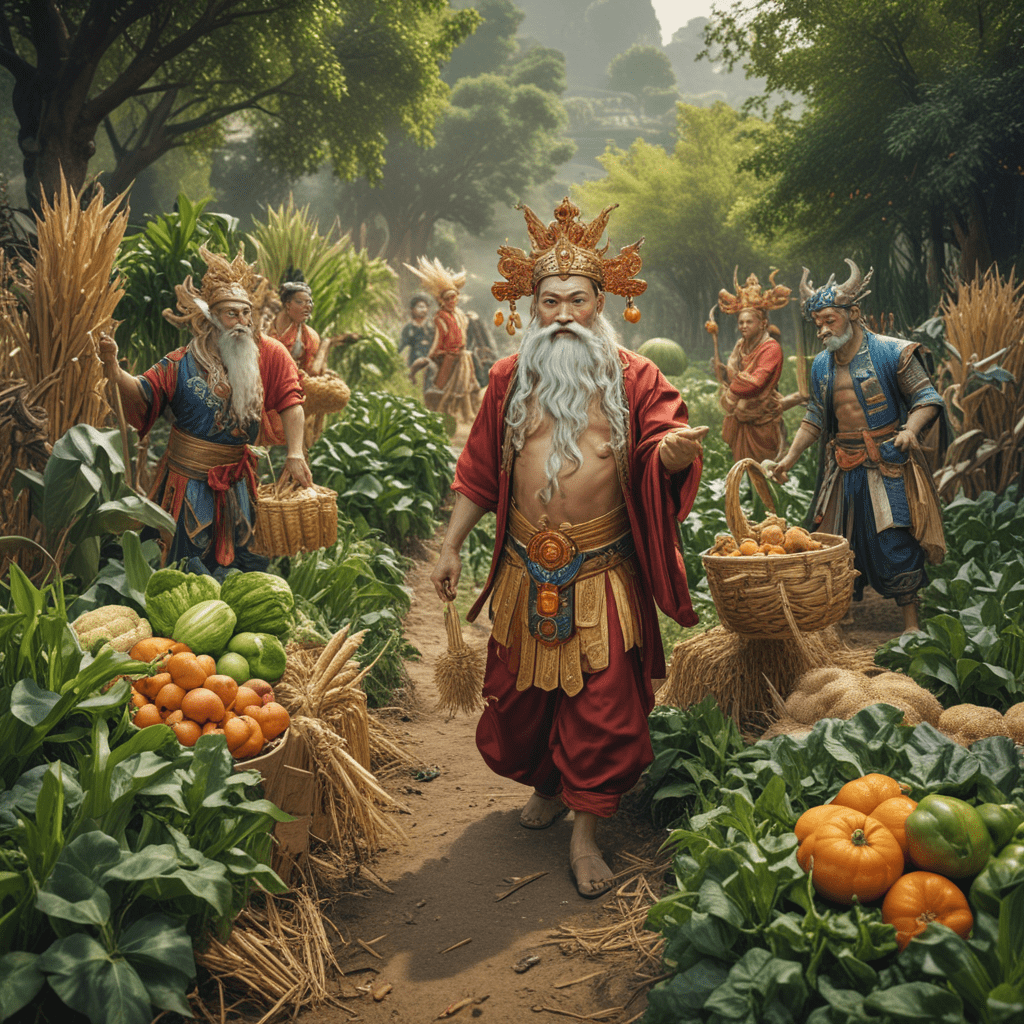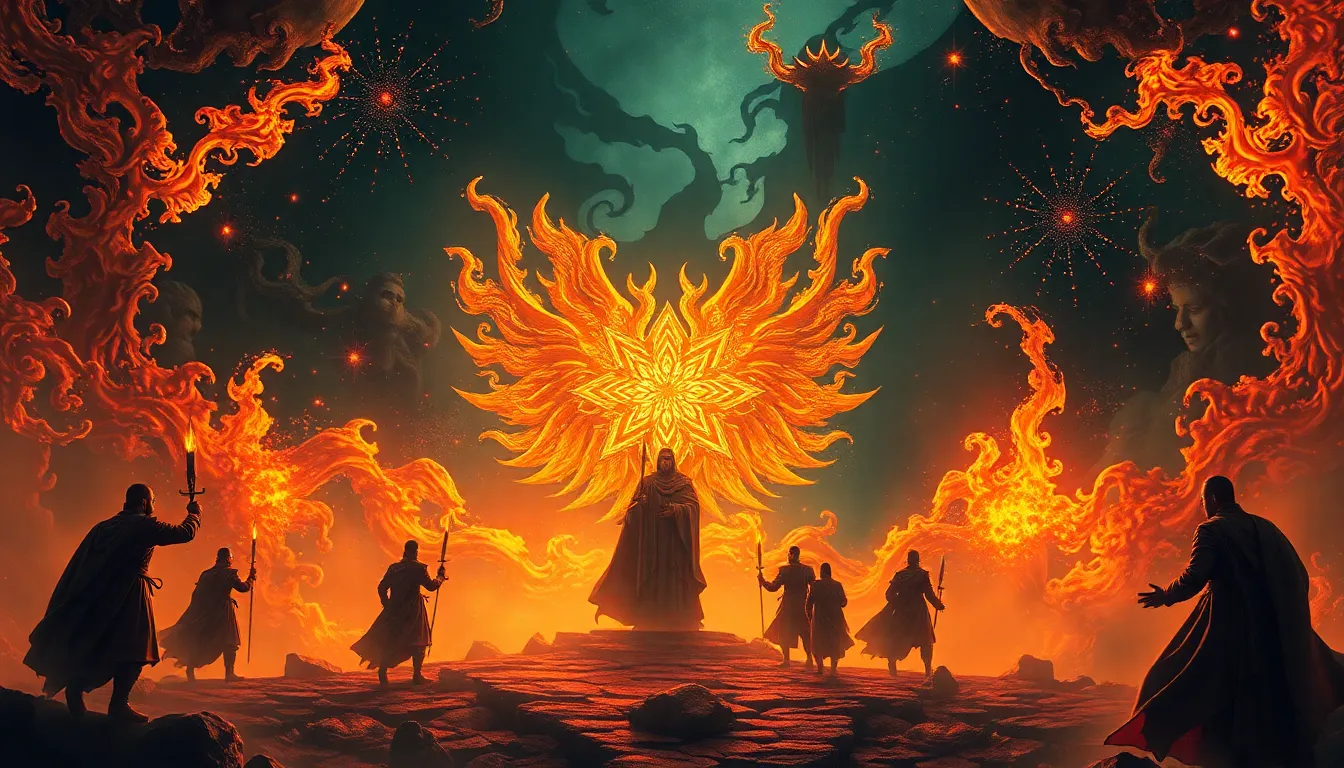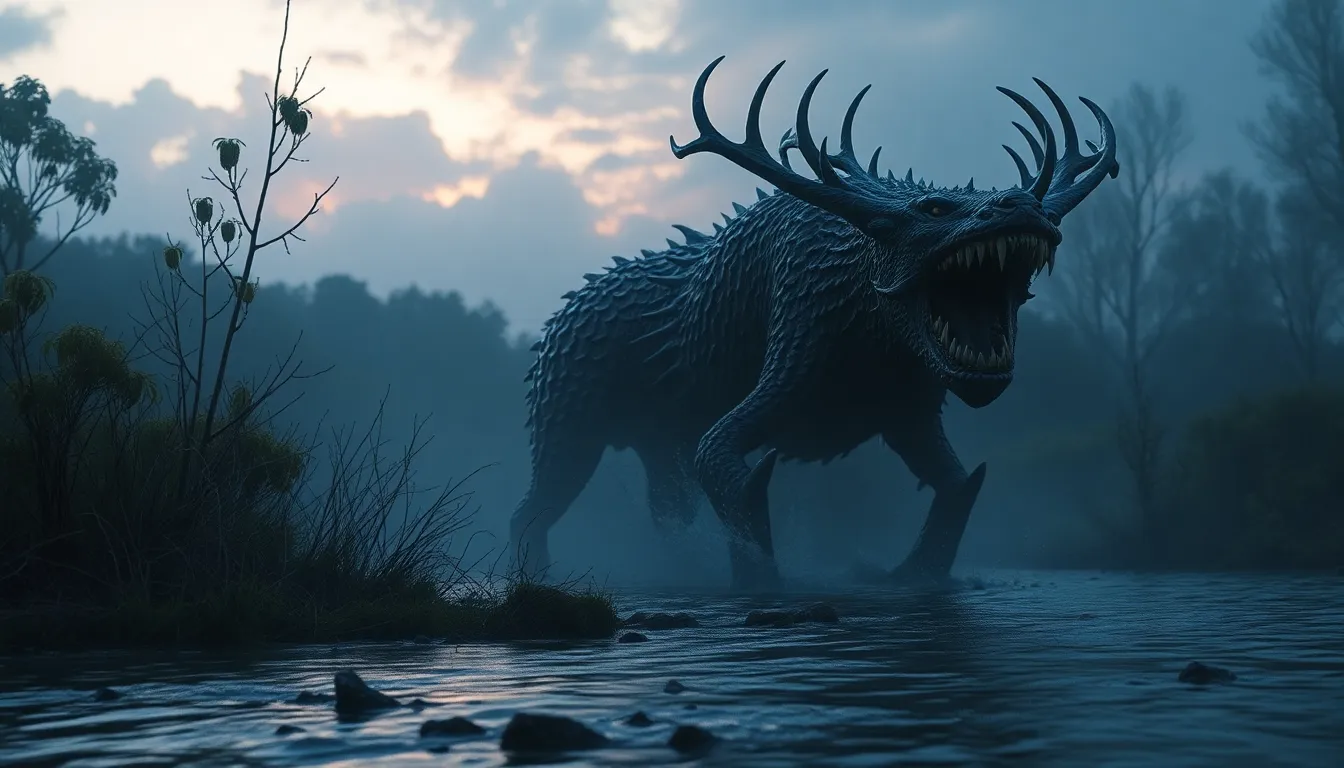Shen Nong, The Divine Farmer
Shen Nong, also known as the Divine Farmer, is a prominent deity in Chinese mythology revered for his contributions to agriculture and medicine. Legend has it that Shen Nong possessed a transparent torso, allowing him to observe the effects of various herbs and plants on his internal organs. Through this unique ability, he is said to have discovered the medicinal properties of numerous plants and introduced them to humans. Shen Nong is credited with identifying over 365 different types of herbs, classifying them into medicinal categories. Additionally, he is believed to have taught humans the techniques of farming, domesticating animals, and using tools. As the patron deity of agriculture, Shen Nong is often depicted with a plow in one hand and a basket of medicinal plants in the other.
Hou Ji, The Lord of Millet
Hou Ji, known as the Lord of Millet, is a legendary figure in Chinese mythology who is credited with introducing the cultivation of millet, wheat, and other grains to humanity. According to myths, Hou Ji was born miraculously from the footprint of a giant. He possessed an innate understanding of agriculture and taught people the techniques of farming and harvesting. Hou Ji is said to have developed the first system of agriculture, including crop rotation and irrigation techniques. He is considered the ancestor of the Zhou Dynasty, which ruled China for over 800 years. In Chinese mythology, Hou Ji is often depicted as a benevolent deity with a serene expression, holding a stalk of millet in his hand.
Qi, The Goddess of Grain
Qi, the Goddess of Grain, is a significant deity in Chinese mythology, symbolizing abundance, fertility, and nourishment. She is believed to oversee the production and distribution of all grains, ensuring their availability for the sustenance of humans. Myths depict Qi as a beautiful and compassionate goddess, often appearing in the fields during harvest time to bless the crops. She is said to protect farmers from pests, droughts, and other misfortunes that could jeopardize the harvest. In ancient Chinese traditions, farmers would make offerings to Qi before planting and harvesting seasons, seeking her favor and protection.
Hou Tu, The Earth Mother
Hou Tu, also known as the Earth Mother, is a revered deity in Chinese mythology who represents the earth, mountains, and caves. She is considered the progenitor and caretaker of all living beings. Myths narrate that Hou Tu created the landmasses and mountains by separating the primordial chaos and established order on Earth. She is believed to nurture and support all forms of life, providing sustenance and shelter. Hou Tu is often depicted as a majestic figure with a benevolent countenance, adorned with symbols of the earth, such as mountains and rivers. Her importance is reflected in the traditional Chinese belief that the Earth is a living entity deserving reverence and respect.
Xuannü, The Yellow Empress
Xuannü, known as the Yellow Empress, is a legendary figure in Chinese mythology associated with agriculture, medicine, and witchcraft. She is believed to be the wife of the Yellow Emperor, a legendary ruler of ancient China. Myths depict Xuannü as a wise and resourceful woman who taught humanity various arts and crafts, including agriculture, weaving, and healing. She is credited with introducing the cultivation of crops such as millet, wheat, and vegetables. Additionally, Xuannü is said to have developed a system of acupuncture and herbal medicine, contributing significantly to ancient Chinese healthcare practices.
6. Yihou, The Rain Master
Yihou, the Rain Master, is a legendary figure in Chinese mythology responsible for bringing rain and controlling storms. Myths depict him as a mighty deity with a fierce appearance, wielding a large thunderbolt and riding a dragon. Yihou is believed to reside in the clouds and has the power to summon or withhold rain at will. Farmers and travelers alike would pray to Yihou for favorable weather conditions, seeking his blessing for abundant crops and safe journeys. In ancient Chinese traditions, ceremonies and rituals were held to appease Yihou and ensure his benevolence.
7. Lei Gong, The Thunder God
Lei Gong, the Thunder God, is a powerful and fearsome deity in Chinese mythology associated with thunder and lightning. He is believed to be the son of Yihou, the Rain Master, and is depicted as a muscular giant with a fierce expression. Lei Gong is said to carry a hammer and chisel, which he uses to create thunder by striking the clouds. Myths narrate that Lei Gong punishes evildoers and protects the innocent from harm. During thunderstorms, people would often pray to Lei Gong for protection, seeking his favor and avoiding his wrath.
8. Feng Bo, The Wind God
Feng Bo, the Wind God, is a significant deity in Chinese mythology who controls the winds and governs the weather. He is often depicted as a benevolent figure with a gentle demeanor, riding a flying chariot. Feng Bo is believed to bring gentle breezes that carry rain clouds and aid in the pollination of crops. He is also said to protect sailors and travelers from storms and ensures safe passage on both land and sea. In ancient Chinese traditions, Feng Bo was revered as a deity who maintained the balance of nature.
9. Yu the Great, The Water Controller
Yu the Great, also known as Dayu, is a legendary figure in Chinese mythology who is credited with controlling floods and establishing order in the world. Myths narrate that Yu the Great was born with a divine ability to control water. He spent years traveling throughout China, dredging rivers, building dams, and creating canals to alleviate devastating floods. Yu the Great's efforts are said to have made the land habitable and suitable for agriculture, laying the foundation for the development of Chinese civilization. He is revered as a hero and a sage whose wisdom and perseverance continue to inspire people today.
10. Zhurong, The Fire God
Zhurong, the Fire God, is a powerful and revered deity in Chinese mythology. He is believed to be the master of fire and is often depicted as a majestic figure with a radiant aura. Zhurong is said to have created fire and taught humans how to use it for cooking, warmth, and protection. He is also associated with warfare and is believed to protect soldiers and warriors in battle. In ancient Chinese traditions, Zhurong was revered as a deity who brought light and warmth to the world and played a crucial role in the development of human civilization.
FAQ
Q: Who is the most important deity of agriculture in Chinese mythology?
A: Shen Nong, the Divine Farmer, is considered the most prominent deity of agriculture in Chinese mythology.
Q: What is the significance of Hou Ji in Chinese mythology?
A: Hou Ji, the Lord of Millet, is credited with introducing the cultivation of grains to humanity and is revered as the ancestor of the Zhou Dynasty.
Q: Which goddess is associated with the abundance of grain in Chinese mythology?
A: Qi, the Goddess of Grain, symbolizes fertility and nourishment and is believed to oversee the production and distribution of all grains.
Q: Who is the Earth Mother in Chinese mythology?
A: Hou Tu, the Earth Mother, represents the earth and all living beings and is considered the progenitor and caretaker of life on Earth.
Q: Which deity is responsible for controlling storms in Chinese mythology?
A: Yihou, the Rain Master, is believed to bring rain and control storms, and is often depicted as a powerful deity riding a dragon.



